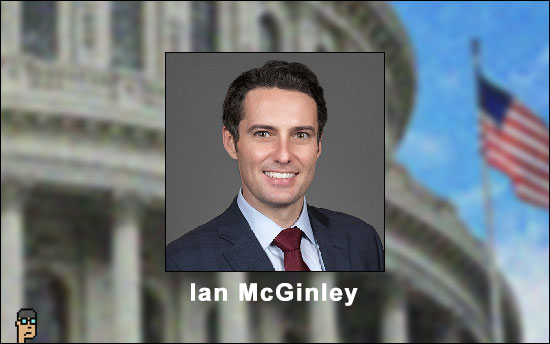Here’s today’s blockchain tipsheet… prefer it by email? Sign up here.
new NFT cop?
With all the talk about being the “cop on the beat” among regulators, the CFTC announced yesterday that it was adding a new top cop, Ian McGinley, as its Enforcement Director who is described as having “…Significant Experience in Commodity Fraud, Crypto and Cyber Enforcement.” Read the release.
Last year, McGinley was named a “Cryptocurrency/Blockchain/Fintech Trailblazer” while practicing law for Akin Gump. In an interview at the time, McGinley said, “In February 2022, I wrote the first article highlighting the rapid growth of non-fungible tokens (NFT) and the likelihood of forthcoming prosecutions in the NFT space, given the hype and amount of money pouring into the industry. Those predictions were correct, as the Department of Justice has now charged three NFT cases.” Read the Q&A. Will NFTs become a new (or renewed) focus for the CFTC?
Tip #1: “Expect indictments in the NFT space soon” (PDF) – Reuters, Feb. ’22
Tip #2: The equivalent role in the Securities Exchange Commission (SEC) would appear to be Gurbir Grewal, the Commission’s Director of Enforcement.
Republican CBDC concerns
With fellow House Republican leaders in the background, Majority Whip Rep. Tom Emmer released video of a speech he gave about central bank digital currencies (CBDCs) amidst the drumbeat of his new bill’s introduction – the “CBDC Anti-Surveillance State Act.” Emmer says in his speech, “This kind of digital currency (CBDCs) would give the federal government access to and control over literally every financial transaction conducted by Americans.” See it.
ransomware use case
During the Q&A of yesterday’s Senate Banking hearing titled “Advancing National Security and Foreign Policy Through Sanctions, Export Controls, and Other Economic Tools,” Senator Elizabeth Warren (D, MA) outlined the “ransomware” use case for crypto. In questioning Daleep Singh, a former advisor on the National Security Council, Senator Warren brought to light the latest ransomware case saying that “attackers stole sensitive investigative information from the United States Marshals Service.” See the Q&A video.
The Senator closed her questioning with a reminder on the bi-partisan Digital Asset Anti-Money Laundering bill she plans on re-introducing in the Senate along with its 2022 co-sponsor Senator Roger Marshall (R, KS).
Tip: “National security” remains a bipartisan interest that could help more Republicans side with Sens. Warren and Marshall.
the european trip
Politico reports that the fact-finding European trip undertaken by congressional staffers last week may have included some hostility as FTX and U.S. crypto legislation lethargy put staffers at odds with their EU counterparts. Read more (subscription). On the digital assets legislation front, the EU has MiCA while the U.S. is still looking for direction.
credit card conflict
Reuters reports that both VISA and Mastercard have decided to slow their experimentation in the crypto space as “regulatory uncertainty” and “market conditions” (perhaps caused by the FTX implosion) weigh on the industry. Read more.
But, Blockworks reports that both VISA and Mastercard remained committed: “Visa says it intends to continue working on its crypto strategy in light of recent reports that say otherwise, while rival Mastercard has flagged intent to focus on a more neutral area: blockchain.” Read that one.
With cryptocurrency’s instant settlement capabilities potentially eroding both companies payment product margins, it is conceivable that there are battles raging within as to whether to enable crypto or let it sink and preserve the traditional, credit card payment business.
DC bankers event
Next Monday and Tuesday’s Institute of Interntional Bankers event in DC will offer updates on U.S. banking policy and business issues from regulatory power players such as CFTC Chair Rostin Behnam, OCC Acting Director Michael Hsu, SEC Commissioners Hester Peirce and Mark Uyeda, NYDFS’ Adrienne Harris and many more. See the agenda.
Tip: The “Digital Assets Panel” brings together an eclectic mix as federal and state digital assets regulation collides:
-
- Beth Knickerbocker, Chief Innovation Officer, OCC
- Jason Somensatto, FinTech Policy Specialist, CFTC
- Matt Lambert, Deputy General Counsel, Conference of State Bank Supervisors
- Kelsey Pristach, Senior Policy Advisor, Senator Cynthia Lummis (R-WY)
states legislating – Illinois
Last week, Illinois introduced two new crypto regulation bills in the state legislature reports Axios’ Crystal Kim – one for a licensing framework, the other a bill to enforce the framework. The Illinois legislation takes its cues from the New York State Bit License which is now seen by some states as the model for state digital assets regulation according to Axios.
Sponsorship of the two bills are led by Rep. Mark Walker in the Illinois State House and Sen. Laura Ellman. Both are Democrats. Rep. Walker says in the IDFPR press release, “These measures not only work to hold bad actors accountable, but allow good actors to enter the marketplace and prove to customers they are operating within the bounds of the law.” With Illinois Governor J.B. Pritzker also being a Democrat, the likelihood of passage appears high.
Tips: The full text of the bills are here:
nominate yourself
Adding to the recent launch of digital asset committees (here and here) in Congress, CFTC Commissioner Caroline Pham announced that nominations for the new Digital Asset Markets Subcommittee under the Global Markets Advisory Committee (GMAC) umbrella are due March 14. Read the release.
GMAC advises the CFTC on “issues that affect the integrity and competitiveness of U.S. markets and U.S. firms engaged in global business. (…) The GMAC also makes recommendations regarding international standards for regulating futures, swaps, options, and derivatives markets, as well as intermediaries. ”
Tip: Subcommittee nominations should be emailed to GMAC_Submissions@cftc.gov
prosecuting FTX: director of engineering
-
- Director Engineering at FTX Pleads Guilty to Fraud – The Wall Street Journal
- SEC Charges Nishad Singh with Defrauding Investors in Crypto Asset Trading Platform FTX – SEC.gov
- CFTC Charges FTX Co-Owner with Fraud by Misappropriation and Aiding and Abetting Fraud Related to Digital Asset Commodities – CFTC.gov
more tips
If you would like this delivered as a newsletter, please sign up here.

